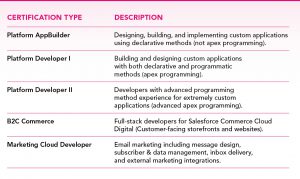How Salesforce Developers Unlock Your Org’s Potential
So you’ve got some ideas about changes to your Salesforce organization (org) but are not sure where to begin. Well, you’ve come to the right place because today we’re going to talk about Salesforce developers.
Salesforce developers can supercharge your organization through unique customizations and integrations. In this article, we’re going to discuss what it is that developers do, how to choose the right one, and where to find them so that you can start making your Salesforce org work for you.
What Do Salesforce Developers Do?
Salesforce Developers help with companies looking to make changes to their organizations. From adding new features or expanding current ones, developers manage and control change within a Salesforce org. There are many areas that fall under a developer’s knowledge base, but we’ll stick with the top three.
Automation Assistance
What makes Salesforce special is how easy they have made it to automate repetitive tasks. There are automation tools standard in all Salesforce organizations, with the main two being Process and Flow Builder. Whether you are looking to automatically populate a field that meets certain criteria, or send an email to a user, the declarative Flow and Process Builder tools are the starting point of any automation journey.
Outside Integrations
Salesforce knows that every client’s circumstances are different and it’s not possible to provide custom solutions for everyone. To fix this, Salesforce allows outside developers to create integrations that fill in the functionality gaps.
Found on the AppExchange, integrations expand Salesforce’s areas like release management and data migration. For example, an application like Flosum allows for even more automation and scalability and offers an easy “clicks-not-code” environment to push accurate and highly automated releases within Salesforce.
Need an integration that helps with shipping and billing? There’s an app for that. Mailing out FedEx or UPS packages? There’s an app for that. Looking to incorporate Quickbooks for invoicing? There’s an app for that too! With 3,400 apps it’s very likely that if you’re looking for a solution you can find it there. While some apps, like Flosum, can make any developer’s life easier, other apps take the place of a developer. Hiring a developer can take the effort out of searching, selecting, and setting up such apps.
In the off-chance that there’s not an app on the AppExchange, there are companies that specialize in making connections not found in the marketplace as well. Zapier and Workato are industry leaders in unique integrations with Salesforce. It’s highly unlikely that any certified developer has not used either of these tools, so it’s a good bet that they can help with these if the project requires it.
Custom Features
Looking for something a little more custom? With programmatic methods, developers can pretty much make anything you can think of a reality. Want a map that shows your site location and nearest technicians? A developer can write a custom app that does just that.
Choosing a Salesforce Developer?
Certified vs. Non-Certified
When looking to hire a Salesforce developer there are two options, certified or non-certified. Non-certified Salesforce developers are more plentiful, but also riskier. A lack of comprehensive knowledge can lead non-certified developers to make costly mistakes, especially in unfamiliar organizations.
We have seen this scenario happen a dozen times. A client looking to save money hires a non-certified freelance developer who breaks their system. The client then fires the developer and now must hire a certified one to fix the issues. When this happens, not only is the client out the money from the first developer but also must pay the new one for the extra work to fix their Salesforce org. Ouch!
The scenario above is exactly why Salesforce always recommends going with certified developers. Certified developers have undergone hours of training and a rigorous test to achieve their certifications. As a bonus, any certified developer is also a certified administrator, so you can rest assured that these people know what they are doing.
Types of Salesforce Developers
All developers are not made equal, and that is especially true with Salesforce certified developers. Depending upon the area of development you are looking for, Salesforce offers five different types of developer certifications. Descriptions of the different certifications can be found below:

If you are unsure of what developer you are looking for, contact Salesforce customer service and ask. Ensuring you have the correct developer for the job is vital for speedy completion and a happy experience all-around.
Where to Find Salesforce Developers?
When looking to hire a Salesforce developer, you first want to start by defining how long you want this developer around for. Are you looking to make a quick change? Or maybe have a project idea that will take a little longer? Choosing the correct developer for your job is important to get it done right.
There are three basic project timelines that developers work on to help make your hiring decision. Those three are project-based, long-term based, or retainer/hybrid.
Project-Based
When looking to hire a developer for a singular project, you want to consider hiring a freelance developer. Freelance developers are developers who work short-term projects with specific goals and deadlines. These types of developers do not work in a system long term and are only there to provide the added functionality and then get out.
If you’re looking for a freelance developer, sites such as Upwork contain hundreds of certified Salesforce developers for hire.
Long-Term Based
Long term projects or multi-project development plans usually require hiring a full-time developer. Full-time developers take the time to really learn your organization, which will pay off in the long run. This is critical for long term project success and hiring a freelance developer should be avoided in these situations.
Websites such as Monster.com, LinkedIn Talent Solutions, and ZipRecruiter are great areas to start searching for a full-time developer. Talking with your HR department is also a great place to begin looking.
Retainer/Hybrid Based
There are companies and freelancers out there that brand themselves as retainer-hybrid developers. These types of developers offer long-term services but do not work full-time. These types of Salesforce developers are great for medium-sized companies that are looking to make some long-term changes but do not wish to hire a full-time developer.
Companies such as Delegate and freelancers on Upwork can be found to help this niche need.
Next Steps
- Explore Flosum on the Salesforce AppExchange
- Try a Free Demo of the #1 Salesforce Release Management Software
- Discover why 98% customers would recommend Flosum Solution
- Read Flosum customer reviews on G2
- Download Free eBook ” Why 80% Salesforce DevOps Initiatives Fail”
- Follow us on LinkedIn and Twitter



